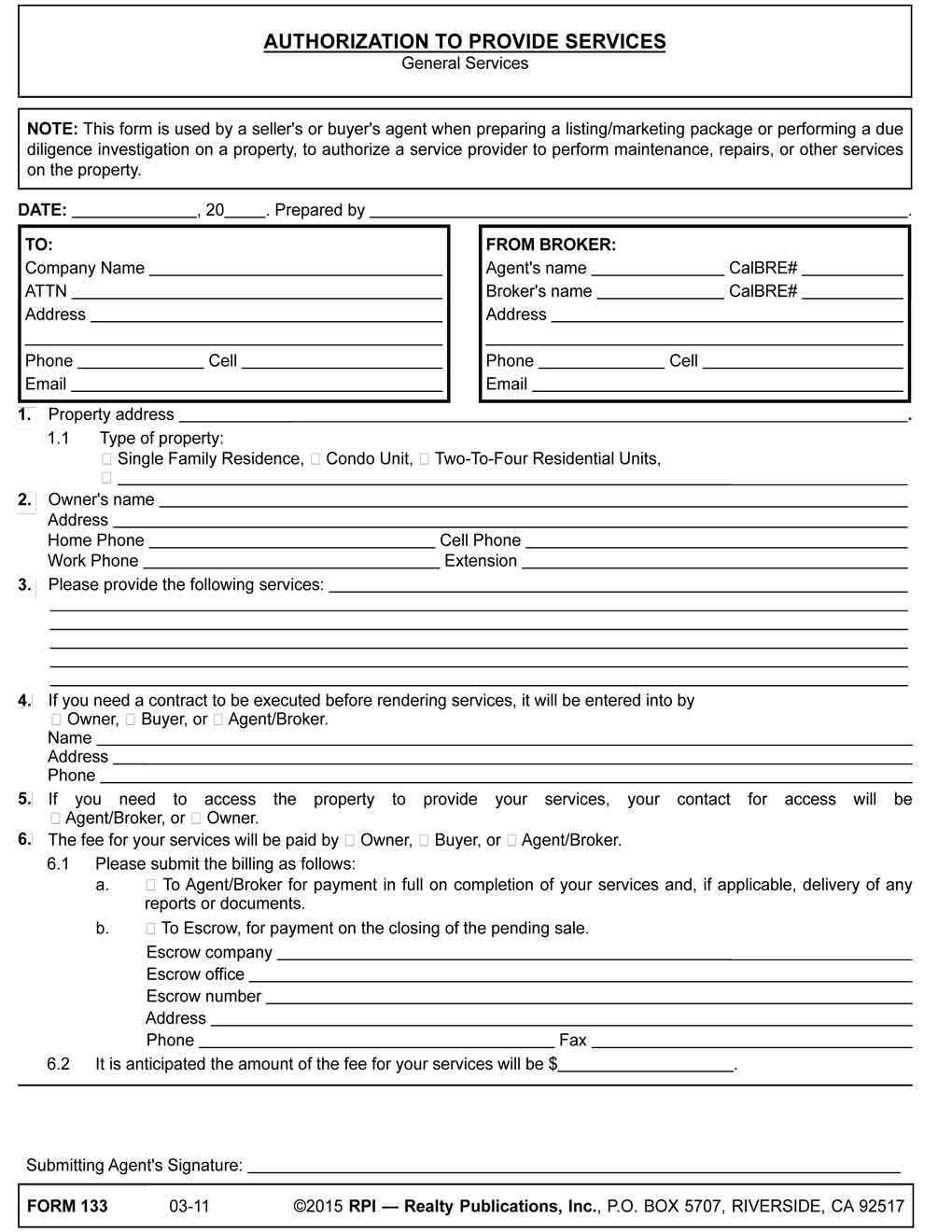This form is used by a seller’s or buyer’s agent when preparing a listing/marketing package or performing a due diligence investigation on a property, to authorize a service provider to perform maintenance, repairs, or other services on the property.
Authorizing repairs
Real estate owners frequently make repairs to add value to their property listed for sale or lease, or when acting as a property manager. The owner deducts these fixer-upper expenses from income or profits.
Property management includes routine maintenance, whether the owner is operating a residential or commercial property.
Routine maintenance prevents obsolescence from decreasing a property’s desirability as a rental, and thus, its value and the total rents it commands.
Agents commonly coordinate repairs on behalf of clients who are listing their property for sale or lease. The agent uses a Work Authorization form to receive the client’s consent for the agent to contract for repairs on the property on the client’s behalf. [See RPI Form 108]
When listing a property for sale, an agent may suggest the owner make specific repairs needed prior to marketing the property at the listed price so the agent may market the property as “turnkey.” The agent explains that turnkey properties command a higher price and usually sell quicker, versus those with known obsolescence or depreciation.
When an agent suggests to their client that repairs be made to a property, owners will frequently entrust their agent to handle contracting the recommended repairs with third-party service providers. The agent uses an Authorization to Provide Services form to allow service providers to perform maintenance or repairs on the client’s property. [See RPI Form 133]
Licensed contractors
For repairs totaling less than $500, the agent may contract with either:
- licensed contractors; or
- unlicensed individuals such as handymen.
However, when the proposed repairs cost $500 or more, an agent who does not have a contractors license is limited in involvement to recommending a competent licensed contractor. All the negotiations, contracting and oversight are the responsibility of the owner directly. [Calif. Business and Professions Code §7048]
The same rules apply to a property manager or landlord overseeing the ongoing repairs and maintenance of property they are managing. A broker, retained as a property manager, is allowed to order out maintenance, repairs and replacements to be performed by third parties when the total cost is less than $500 per project.
An agent who is also a licensed contractor may order out work as authorized by the owner of the property regardless of the cost.
Although unlicensed individuals may be used for conducting repairs totaling less than $500, it’s best business practice to obtain a licensed contractor who specializes in the type of repair requested, such as plumping, roofing, electrical, carpentry or painting. Brokers can determine the specialization of the contractor by interviewing the contractor, reviewing their marketing materials and getting a copy of their business card.
Analyzing the authorization to provide services
A seller’s or buyer’s agent uses the Authorization to Provide Services published by RPI when preparing a listing/marketing package or performing a due diligence investigation on a property. The form allows the agent to authorize a service provider to perform maintenance, repairs, or other services on the property. [See RPI Form 133]
The Authorization to Provide Services contains:
- Property Address information and the type of property, including:
- single family residence (SFR);
- condo unit;
- two-to-four residential unit; or
- other [See RPI Form 133 §1];
- Owner’s Information, including their:
- name;
- address;
- home phone;
- work phone;
- cell phone; and
- extension number [See RPI Form 133 §2];
- Services Requested: The broker lists the services the client has authorized to be completed on their property [See RPI Form 133 §3];
- Contract Participants involved when the service provider needs to execute a contract before rendering services, including the:
- owner;
- buyer; or
- agent/broker, and their name, address and phone number [See RPI Form 133 §4];
- Contact for Access: The agent or broker checks whether the person to be contacted for the service provider to access the property will be the:
- agent/broker; or
- owner [See RPI Form 133 §5];
- Fee for Services: The agent or broker checks the person responsible for paying the service provider, including the:
- owner;
- buyer; or
- agent/broker;
- where the service provider will submit the billing, including to:
- the agent/broker; or
- escrow, including the escrow company name, office, number, address and phone number; and
- the agent or broker enters the anticipated fee due the service provider for services rendered [See RPI Form 133 §6]; and
- Signature of the submitting agent. [See RPI Form 133]
Form navigation page updated 07-2022.
Form last updated 06-2017 to include the Form Description at the top, white header/footer convention and RPI branding.
Form-of-the-Week: Marketing Package Cost Sheet and Authorization to Provide Services — Forms 107 and 133
Form-of-the-Week: Work Authorization and Authorization to Provide Services — Forms 108 and 133
Book: Due Diligence and Disclosures, Chapter 5: Greater transparency in marketing
Book: Real Estate Practice, Chapter 13: Greater transparency in marketing
Client Q&A: Marketing package
Letter to the Editor: Who performs the maintenance and repairs: the tenant, or the landlord?














